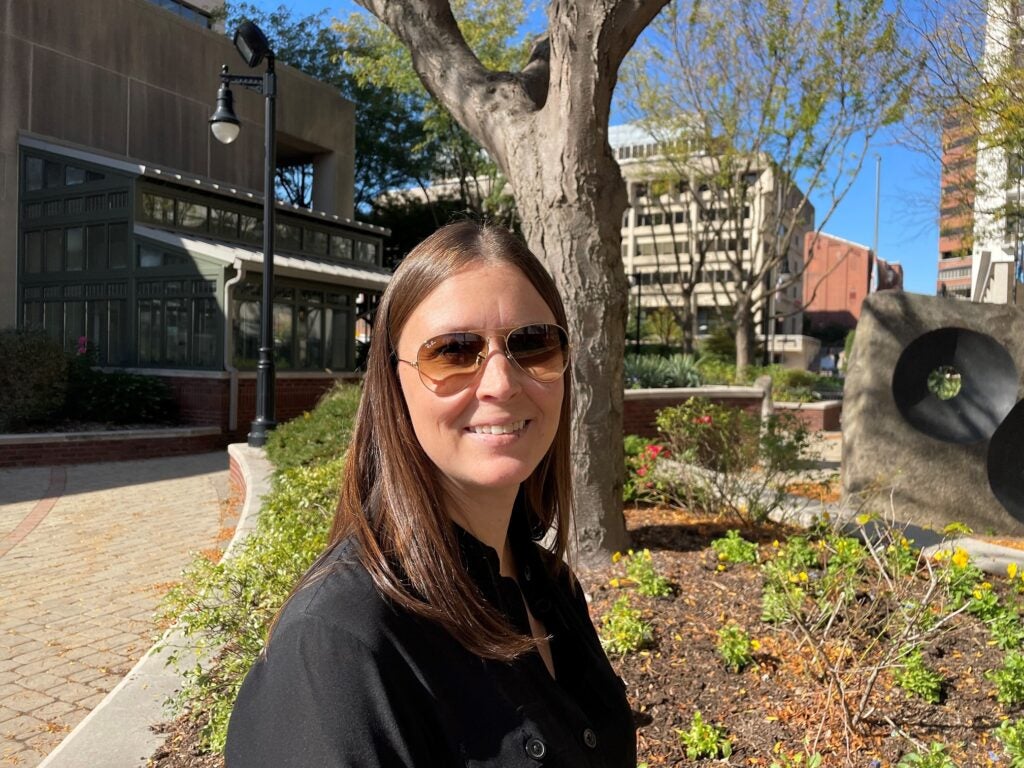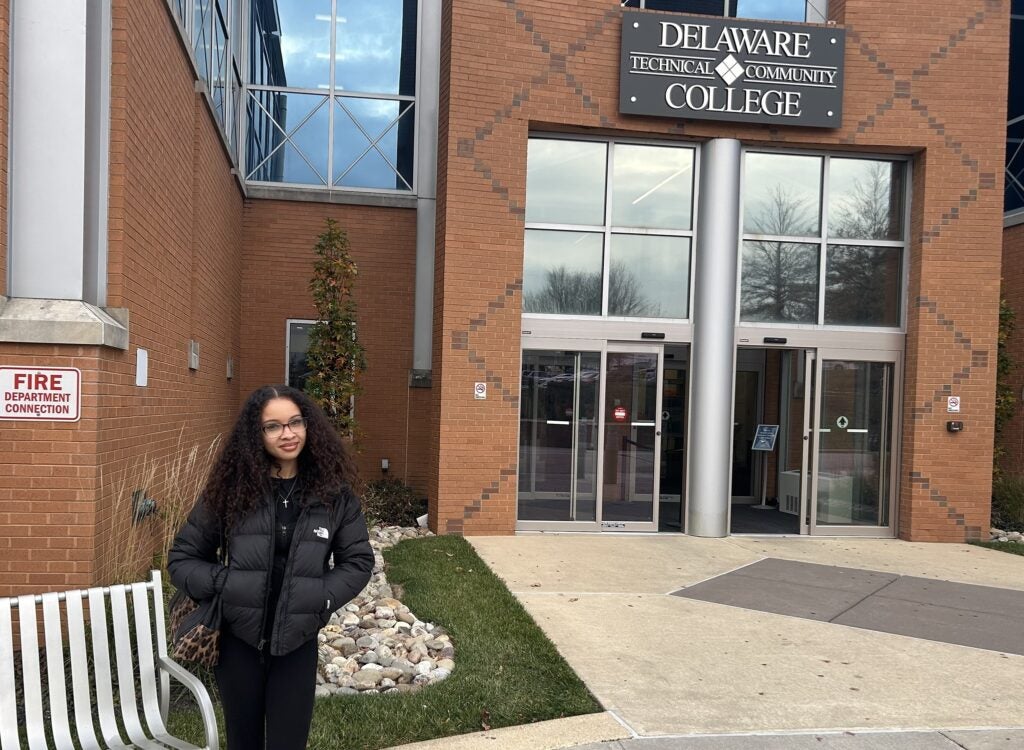‘Making their dreams come true’: Tuition waiver program helps dozens of former Delaware foster kids attend college
Young adults who have been in the state’s custody can attend three in-state colleges with no worries about the formidable cost of higher education.
Listen 2:05
Jenaya Vann is grateful to be at Delaware Tech and free of financial worries while she gets her college education. (Courtesy of Jenaya Vann)
What are journalists missing from the state of Delaware? What would you most like WHYY News to cover? Let us know.
Ny’esha James attends the University of Delaware, where she’s a freshman aspiring to be a teacher.
Jenaya Vann goes to Delaware Technical Community College, where she’s aiming to get into the diagnostic medical sonography program.
The young women also share a bond — they both spent time in the state’s foster care system.
They’re among 26 students who attend Delaware colleges without having to pay tuition, mandatory fees or other costs, such as books, housing and meal plans.
James, Vann and other former foster kids are now pursuing degrees in higher education courtesy of the Fostering Independence Through Education Tuition Waiver that state lawmakers passed with near unanimity in 2021. Since spring semester 2022, about 40 students have received the waiver and five have graduated, state officials who oversee the program said.
James, who said she and several siblings were removed from her mother’s home on Wilmington’s East Side after it was robbed and state child protection workers investigated, calls the program a godsend.

She spent years in foster care, bouncing from one home to another, but was diligent with her academics and graduated from Smyrna High this year. Now, she lives in a dormitory on the Newark campus, takes a full slate of classes and has a full meal plan — at no expense.
“The main reason why I’m happy to be in the program is because I don’t have to worry about where money is coming,” James told WHYY News. “I can just focus on my studies and not have to think, ‘Oh, I have to pay for my tuition and I have to do this and do that.’ So I feel like it’s very important to not have another thing to stress about.”
The legislative effort was inspired by the fact that boys and girls who age out of the foster care system at the age of 18 are often left with few, if any, financial resources or the skills to navigate the process of applying to college and getting financial aid.

Meredith Seitz, who in 2021 was policy adviser for the state Department of Services for Children, Youth and Their Families and is now chief of staff, said her office believed the state and the higher education community needed to continue supporting foster kids after they turn 18.
“Some have been in foster care for a short time, some for maybe a longer time, but regardless, they’ve experienced a good amount of trauma, no matter what the circumstances were that brought them into foster care,” Seitz said. “So then once they’re in our care, we as the state have the responsibility not just for their health and safety but, I think from our department’s perspective, to put the conditions in place to give them a chance to succeed, right? That’s what we would do for our own families.”
‘Allows them to focus on the essentials and thrive’
The tuition waiver program is open to any adult under age 27 who lives in Delaware and spent at least a year in the state’s foster care system from age 14 to 18.
The waiver is good for five years as long as they are enrolled full-time at UD, Delaware Tech or Delaware State University.
Each of the three colleges has a designated point person to assist students, including helping them verify eligibility, access financial aid and scholarship opportunities and for referrals to on-campus support services, including mental health and tutoring programs.
At the state level, the waiver program is overseen by Sophia Saikin, director of youth advancement services for the state Office of the Child Advocate.
Saikin said the initiative grew out of discussions among foster kids who meet monthly as part of the Helping Our Peers Evolve group.
Many wanted to go to college, but when “they were looking at how expensive school was, it was just too much,” Saikin said. This year at the University of Delaware, for example, in-state tuition, fees, room and board costs $33,634.
“When it came to how am I going to afford these thousands and thousands of dollars of education, it just turns many young people away,” Saikin said. “They would like to attain these bachelor degrees but they couldn’t. There were too many barriers in place.”

Those conversations reached the state level and led to state Rep. Krista Griffith sponsoring the bill that became law in the summer of 2021, when then-Gov. John Carney signed it.
Saikin said one added benefit is that students can stay in their housing and receive meals during holiday and semester breaks.
“It allows them to stay on campus year-round, which is a huge piece to this because the housing stability, again, was a really big barrier for a lot of students, especially this population. They don’t have mom and dad or a grandma to go home to,” Saikin said. “That housing piece is so critical to allow that stability for the student to stay on campus, maintain focus on their education, and not have to worry about what kind of roof is going to be over their head, where are they going to get their next meal from.”
Nor do young adults whose childhoods were filled with instability and often chaos or abuse have to worry about repaying pricey student loans, she said.
“This opportunity allows them to focus on the essentials and then to be able to thrive,” Saikin said. “At the end of the day, they’re obtaining jobs that they’ve wanted, they have their degrees that they always had hoped for.”
Currently, 16 students with waivers are attending Delaware State, six are at UD and four are at Delaware Tech, Saikin said.
Of the five graduates, one received a master’s degree, another played varsity sports and majored in engineering, and one interned with Disney after getting a degree in communications.
“It’s really exciting to see these young adults achieving their goals and making their dreams come true,” Saikin said.
‘Who knows if I’d even be in school right now?’
Vann has used the waiver program at Delaware State and Delaware Tech, where she hopes to be accepted into the program to become an ultrasound technician.
When she was 16 and attending Howard High School of Technology, Vann and three siblings were removed from the tiny apartment in Bear where they lived with their mother. When she learned about the waiver program, she leaped at the chance to participate.
“I knew I wanted to go to college, but I never really grasped how I would pay for it,” Vann said.
But when her case worker told her about the waiver program, “I’m like, that’s great. I can actually do something without having to worry about the cost,” she said.
Initially, Vann went to Delaware State with hopes of becoming a dentist after completing the dental assistant program at Howard. But then she began thinking about the debt she’d accumulate in medical school.
“I started exploring my options” in the health care field, she said. That led to an interest in ultrasound and her transfer to Delaware Tech.

Vann has a housing voucher through another grant program and is free to concentrate on her academics.
“Not to toot my own horn, but I’ve always been pretty good in school,” Vann said. “So my grades are good.”
And she’s so grateful for the waiver program that’s allowing her to pursue her goals.
“When I imagine a life where I don’t have any of this, there’s not much I can imagine other than just struggling,” Vann said. “If I didn’t have housing, for example, who knows where I’d be living. If I didn’t have help paying for my tuition, who knows if I’d even be in school right now? I probably would have just stuck with being a dental assistant because that’s all I know.”
Seitz said that’s the whole point.
“We really thought at the time, and this has been borne out, that if we can provide that level of support, it will make their lives easier,” Seitz said. “And make it so that they can have a chance to succeed where otherwise the road may have been too hard for them to go that route towards higher education.”

Get daily updates from WHYY News!
WHYY is your source for fact-based, in-depth journalism and information. As a nonprofit organization, we rely on financial support from readers like you. Please give today.









